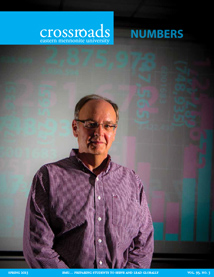
Loren Swartzendruber ’76, MDiv ’79, DMin
After a couple of decades of massive scandals in the U.S. financial world – Enron, the savings and loan industry, the federal bail-out of this country’s top banks – it has become commonplace at business departments at colleges and universities across the country to speak of the value of “ethics” and of considering “the public good.”
At the risk of sounding immodest about EMU, our business and accounting professors have been raising such matters since this institution began offering business classes. Many of those interviewed for Crossroads credited their church-rooted parents for instilling in them the importance of maintaining their integrity and caring for the well-being of others, both at home and at work. But they also credited EMU for reinforcing this ethos.
That was certainly my personal experience, growing up in a business-oriented family and then attending EMU. My father owned a farm-implement dealership in Kalona, Iowa, where I worked from an early age through college. My first experience with “fundraising” was going into the fields to find farmers and ask for the payments they owed my father.
Dad could not stay in business, and keep supplying farmers with the equipment they needed, if he did not collect on debts. Yet, sometimes, in cases of real hardship, Dad did write-off debts. And my parents always contributed (financially and as volunteers in many roles) to our church, regardless of the economic circumstance, because they believed we were part of a larger church community that also could not survive without regular infusions of money.
Dad’s business practices were a bit unusual. He and his business partners paid themselves an hourly wage rather than take a salary. All employees received a bonus after a profitable year. In quite a few years Dad took unpaid “vacation” weeks to teach Summer Vacation Bible School in our home congregation and at a mission church out of state. For most of his 40+ year business career, Dad worked six days a week, but I didn’t mind because I was with him when I wasn’t in school.
We need our people in finances and business, and they need the thoughtfulness and ethical foundation that comes from being part of a larger community that asks the hard questions, as does an organization to which I belong, Mennonite Economic Development Associates. I believe this is why EMU was teaching about “ethics” and “the public good” long before many other educational institutions realized the importance of such teachings.
Loren Swartzendruber
President
